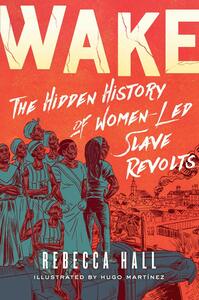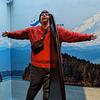You need to sign in or sign up before continuing.
Take a photo of a barcode or cover
Gorgeous graphic novel about a Black queer female historian and her search for the truth about women’s roles in slave revolts. This book felt on par with Maus in its importance, poignancy, and blending of the personal with the historical. Dr. Hall’s research takes her to New York and London, two cities rarely associated with American slavery, and she shows how much information can be gleaned from the banal record keeping required to turn human beings into commodities. The most surprising fact I learned was that slave revolts on ships increased with the number of women on board — likely because women were allowed on deck unchained while men were kept under lock and key. The patriarchal bullshit that led to this fact and the strength of these women who seized their advantage — one estimate suggesting that revenue lost from these slave revolts prevented nearly a million more people from being forced to endure the Middle Passage — is just astounding. Definitely recommend reading this book over and over.
informative
sad
fast-paced
“They erased us from the record, but they could not erase our lived experience.” — Rebecca Hall, Wake
Wake: The Hidden History of Women-Led Slave Revolts is a powerful reclamation of forgotten narratives. Rebecca Hall combines deep archival research with personal storytelling and graphic novel elements to uncover the overlooked role of Black women in organizing and leading revolts during slavery. The fusion of memoir and history is both intimate and urgent—Hall’s own journey as a Black woman historian navigating institutional gatekeeping adds a compelling layer to the broader historical silencing she’s working to undo.
The graphic format, illustrated by Hugo Martínez, adds emotional weight to the story, bringing Hall’s research and imagination vividly to life. While some parts felt a bit rushed or left me wanting more historical detail, the overall impact is profound. Wake is as much about the erasure of truth as it is about resistance and resilience. It challenges how history is written and who gets remembered, making it a necessary and resonant read for anyone interested in untold histories and radical storytelling.
Wake: The Hidden History of Women-Led Slave Revolts is a powerful reclamation of forgotten narratives. Rebecca Hall combines deep archival research with personal storytelling and graphic novel elements to uncover the overlooked role of Black women in organizing and leading revolts during slavery. The fusion of memoir and history is both intimate and urgent—Hall’s own journey as a Black woman historian navigating institutional gatekeeping adds a compelling layer to the broader historical silencing she’s working to undo.
The graphic format, illustrated by Hugo Martínez, adds emotional weight to the story, bringing Hall’s research and imagination vividly to life. While some parts felt a bit rushed or left me wanting more historical detail, the overall impact is profound. Wake is as much about the erasure of truth as it is about resistance and resilience. It challenges how history is written and who gets remembered, making it a necessary and resonant read for anyone interested in untold histories and radical storytelling.
challenging
dark
emotional
informative
medium-paced
The graphic novel format is perfect for this book. The illustration gives life to the characters and really tells the story of their pain. It's well worth the read.
informative
reflective
sad
medium-paced
dark
emotional
informative
inspiring
reflective
sad
medium-paced
Excellent book. I love how this story was told both from the personal lens of historian Dr. Hall and her experiences while researching, as well as the historic lens (eg what she learned). I could feel the weight of history and how it impacts us intergenerationally, as well as the power of resilience.
I picked up this book as a possible resource for my American Ethnic Studies class and poured through it in 45 minutes. I don't usually go for graphic novels, but this mash-up of historical fiction/non-fiction ("historical imagination") and memoir was a brilliant read. Dr. Hall uses the process of researching and writing her doctoral dissertation on women-led slave revolts in the 1700s as the basis for both imagining what that history really looked like (since the historical documents themselves are either missing or intentionally vague) and writing about the experience of uncovering one's lost historical lineage. Hall uses her research and historical inferences to piece together women-led slave revolts that happened in her hometown of New York City in the early 1700s and on British-owned slave ships during the height of the Atlantic Slave Trade. At the same time, she chronicles her experience throughout the research process - being met with disbelief ("women didn't lead slave revolts; they participated in more individual acts of sabotage"), resistance ("why do you want to see *those* documents"), and even hostility ("you may not access our archives - it's private property"). Hall's work (and Hugo Martinez's haunting illustrations) creates a dialogue between past and present that is fully engrossing and leads to more questions like "what else have we written out of the story?"
This book really demonstrates how the gaps in history lead to an erasure of people, the effects of which people are still living with today.




